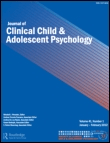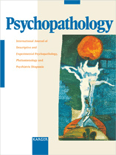
DEVELOPMENT AND PSYCHOPATHOLOGY
Scope & Guideline
Advancing Understanding of Developmental Challenges
Introduction
Aims and Scopes
- Developmental Psychopathology Framework:
The journal focuses on the developmental psychopathology framework, which examines the interplay between developmental processes and psychopathological outcomes, emphasizing longitudinal studies that track changes over time. - Multifactorial Influences:
It highlights the multifactorial influences on mental health, including genetic, environmental, and social factors, and how these factors interact across different stages of development. - Interdisciplinary Approaches:
The journal promotes interdisciplinary approaches, incorporating insights from psychology, neuroscience, genetics, social sciences, and public health to provide a comprehensive understanding of developmental psychopathology. - Focus on Vulnerable Populations:
Research often centers on vulnerable populations, such as children exposed to adversity, those with developmental disorders, and marginalized groups, to better understand the unique challenges they face and identify protective factors. - Longitudinal and Cross-Generational Studies:
It emphasizes the importance of longitudinal and cross-generational studies to explore the stability and change of mental health outcomes over time, as well as the transmission of risk and resilience across generations.
Trending and Emerging
- Resilience and Protective Factors:
An increasing focus on resilience and protective factors is evident, with research exploring how individuals and families can overcome adversity and promote positive mental health outcomes. - Neurodevelopmental Perspectives:
Emerging themes include neurodevelopmental perspectives on psychopathology, particularly how brain development influences behavior and mental health across different stages of life. - Intergenerational Transmission of Risk:
There is a growing interest in the intergenerational transmission of risk and resilience, examining how parental experiences and behaviors affect child development and mental health. - Cultural and Contextual Influences:
Research is increasingly considering cultural and contextual influences on development and psychopathology, highlighting the importance of understanding diverse experiences and backgrounds. - Integration of Technology in Research:
The integration of technology in research methodologies, such as the use of digital tools for data collection and analysis, is becoming more prevalent, allowing for innovative approaches to studying developmental psychopathology.
Declining or Waning
- Focus on Adult Psychopathology:
There has been a noticeable decrease in studies specifically targeting adult psychopathology, as the journal increasingly emphasizes developmental trajectories and early intervention strategies. - Traditional Diagnostic Categories:
Research centered on traditional diagnostic categories, such as strictly defined mental disorders, appears to be waning in favor of more nuanced, dimensional approaches that consider a broader spectrum of behaviors and symptoms. - Static Measurement Approaches:
The use of static measurement approaches, such as cross-sectional studies that do not account for developmental changes over time, is declining as the field moves towards longitudinal methodologies that capture dynamic processes. - Singular Focus on Risk Factors:
There has been a shift away from studies that exclusively focus on risk factors without considering protective factors or resilience, as the journal increasingly promotes research that explores both sides of the equation. - Overemphasis on Pathology:
Research that overemphasizes pathology without a balanced view of positive development and resilience is becoming less prominent, as the journal encourages a more holistic understanding of child development.
Similar Journals

JOURNAL OF CLINICAL CHILD AND ADOLESCENT PSYCHOLOGY
Exploring innovative interventions for young minds.JOURNAL OF CLINICAL CHILD AND ADOLESCENT PSYCHOLOGY, published by Routledge Journals, Taylor & Francis LTD, is a premier, peer-reviewed academic journal dedicated to the fields of clinical psychology, developmental, and educational psychology. With an impressive impact factor reflecting its esteemed reputation, this journal is currently ranked Q1 in both Clinical Psychology and Developmental and Educational Psychology categories, showcasing its significant contribution to the advancement of knowledge in these disciplines. Covering a convergence period from 1999 to 2024, it serves as a vital resource for researchers and practitioners seeking to explore innovative interventions, evidence-based practices, and developmental theories relevant to children and adolescents. Accessible from the United States and adhering to rigorous academic standards, this journal invites contributions that facilitate understanding and improvement of psychological health in youth, making it an indispensable tool for professionals dedicated to shaping the future of mental health.

PSYCHOANALYTIC PSYCHOLOGY
Advancing the Frontiers of Psychoanalytic ThoughtPSYCHOANALYTIC PSYCHOLOGY is a distinguished journal published by the Educational Publishing Foundation of the American Psychological Association, specifically tailored to the field of Clinical Psychology. With an ISSN of 0736-9735 and an E-ISSN of 1939-1331, this journal has been a pivotal platform for scholarly discourse since its inception in 1984 and will continue to serve the academic community through 2024. While the journal currently operates under traditional access options, it maintains a reputable presence in the field, reflected by its ranking in the Q3 category for Clinical Psychology as of 2023, and a Scopus percentile that places it in the 41st percentile among its peers. Aimed at researchers, professionals, and students alike, PSYCHOANALYTIC PSYCHOLOGY is committed to advancing psychoanalytic practice and education through the dissemination of rigorous research findings, theoretical discussions, and innovative clinical practices, solidifying its importance in the continuous evolution of psychological science.

PSYCHOPATHOLOGY
Fostering Collaboration in Clinical PsychologyPSYCHOPATHOLOGY, published by KARGER, is a prestigious academic journal that has been a cornerstone in the fields of clinical psychology and psychiatry since its inception in 1968. With a robust impact factor and a commendable ranking within the upper quartiles (Q1) of its categories for 2023, the journal is recognized for its rigorous peer-reviewed articles that contribute significantly to the understanding and treatment of mental health disorders. Hailing from the beautiful country of Switzerland, this journal not only fosters innovative research but also encourages interdisciplinary collaboration among scholars, practitioners, and students alike. Although currently not an Open Access journal, it continues to provide valuable insights, enhancing the understanding of psychopathological phenomena and promoting better clinical practices. With a commitment to excellence, PSYCHOPATHOLOGY aims to disseminate crucial findings and innovative methodologies that shape the future of mental health research.

JOURNAL OF RESEARCH ON ADOLESCENCE
Navigating the Pathways of Youth UnderstandingWelcome to the Journal of Research on Adolescence, a premier publication dedicated to advancing the understanding of the complex developmental processes of adolescence. Published by Wiley in the United Kingdom, this journal has established itself as a vital resource in the fields of Behavioral Neuroscience, Cultural Studies, and Developmental and Educational Psychology, proudly holding a Q1 ranking across multiple categories in the 2023 Scopus ranking system. With its ISSN 1050-8392 and E-ISSN 1532-7795, the journal supports a rich tradition of scholarly exploration and interdisciplinary dialogue since its inception in 1993. Although not an open-access journal, it offers subscription-based access to its critical insights and research findings. Aspiring to provide a platform for researchers, educators, and policymakers, the Journal of Research on Adolescence fosters innovative approaches and diverse perspectives necessary for understanding and addressing the challenges faced by today's youth. Join us as we delve into the ever-evolving landscape of adolescent research, shaping the discourse for future generations.

Journal of Psychopathology and Clinical Science
Exploring New Dimensions in Clinical ScienceJournal of Psychopathology and Clinical Science, published by the American Psychological Association, is an emerging interdisciplinary journal dedicated to advancing the understanding of mental health disorders and psychopathology through rigorous scientific inquiry. With an ISSN of 2769-7541 and E-ISSN 2769-755X, the journal aims to serve as a vital platform for researchers, clinicians, and students in the fields of psychology, psychiatry, and neuroscience. As it converges from 2023 to 2024, the journal seeks to bridge the gaps between clinical practice and scientific research, fostering collaboration among diverse professionals in a rapidly evolving landscape. Although currently not open access, it provides crucial insights that are substantiated by its rankings in various categories, including a percentile of 15th in Medicine (Psychiatry and Mental Health) and 18th in Psychology, indicating a commitment to high-quality scholarship amidst challenging competition. Access to its articles will underpin further research and training while spotlighting the importance of innovative methodologies in understanding psychopathological phenomena.

BULLETIN OF THE MENNINGER CLINIC
Connecting professionals through peer-reviewed insights.The BULLETIN OF THE MENNINGER CLINIC, an esteemed publication of GUILFORD PUBLICATIONS INC, has been a pivotal resource in the fields of Clinical Psychology and Psychiatry since its inception in 1945. With ISSN 0025-9284 and E-ISSN 1943-2828, this journal is recognized for its commitment to advancing knowledge and practices in mental health. Indexed in Scopus with respectable rankings across various categories, it stands in the Q3 quartile for both Clinical Psychology and Psychiatry and Mental Health, indicating its role as a significant contributor to academic discourse. Although it operates under a subscription model, the journal features a broad spectrum of peer-reviewed articles, case studies, and research findings that are essential for professionals, researchers, and students dedicated to understanding and improving mental health care. The BULLETIN OF THE MENNINGER CLINIC serves as a vital platform for interdisciplinary dialogue, fostering innovative approaches and methodologies that shape the future of mental health treatment and research.

International Review of Sport and Exercise Psychology
Elevating research on mental health in physical activity.International Review of Sport and Exercise Psychology is a premier academic journal dedicated to advancing the understanding of psychological aspects in sport and exercise settings. Published by Routledge Journals, Taylor & Francis Ltd, this journal boasts an impressive Q1 ranking in both Applied Psychology and Sports Science categories, solidifying its position within the top tier of scholarly publications. Pivotal for researchers, professionals, and students alike, it aims to disseminate high-quality research exploring the psychological dynamics influencing performance and well-being in physical activity contexts. The journal covers diverse topics ranging from motivation and team dynamics to mental health and performance enhancement, serving as a vital resource for ongoing scholarship in the field. With an extensive collection of cutting-edge studies since its inception in 2009, the International Review of Sport and Exercise Psychology continues to be an essential platform for innovative ideas and rigorous research, available through traditional access models.

INTERNATIONAL JOURNAL OF BEHAVIORAL DEVELOPMENT
Innovating research in developmental and educational psychology.INTERNATIONAL JOURNAL OF BEHAVIORAL DEVELOPMENT, published by SAGE PUBLICATIONS LTD, is a premier academic journal dedicated to advancing the fields of developmental and educational psychology, developmental neuroscience, and social psychology. With an impressive impact factor and a Q1 ranking across multiple categories for 2023, this journal ranks among the top 25% in various social science domains, including education and lifespan studies. Its commitment to publishing high-quality research makes it an essential resource for researchers, educators, and students focused on understanding behavioral development across the lifespan. The journal aims to disseminate innovative findings, fostering a deeper comprehension of the behavioral factors that shape human growth and interactions. Through its rigorous peer-review process and global editorial standards, it not only enhances the academic conversation but also influences policy and practice in related fields. For more information, readers can access additional content through subscription or institutional access options.

JOURNAL OF PSYCHIATRIC RESEARCH
Exploring the Complexities of Mental HealthJournal of Psychiatric Research, published by Pergamon-Elsevier Science Ltd, is a premier academic journal dedicated to advancing our understanding of psychiatric disorders and mental health. With its ISSN 0022-3956 and E-ISSN 1879-1379, the journal has established a significant presence in the field, reflected in its impressive Q1 ranking in both Biological Psychiatry and Psychiatry and Mental Health as of 2023. Nestled in the heart of the United Kingdom, the journal has been fostering scholarly discourse since its inception in 1961, with publication horizons extending to 2024. As an authoritative source of empirical research, the journal attracts a global readership, providing vital insights that inform clinical practices and policies. It holds a respectable rank of #103 out of 567 in Medicine and Psychiatry and Mental Health, with an 81st percentile ranking, underscoring its influence in shaping psychiatric research. Although it does not offer open access, the journal is dedicated to disseminating critical knowledge that enables researchers, clinicians, and students to address the complexities of mental health challenges effectively. For those engaged in psychiatric studies, the Journal of Psychiatric Research remains an indispensable resource.

PSYCHIATRIE DE L ENFANT
Fostering knowledge for healthier childhoods.PSYCHIATRIE DE L ENFANT is a distinguished academic journal published by PRESSES UNIV FRANCE, focusing on the significant realm of child psychiatry and developmental psychology. With its ISSN 0079-726X and E-ISSN 2102-5320, this journal provides a platform for researchers, practitioners, and educators to explore various topics surrounding mental health in children. Although the coverage in Scopus has been discontinued since 2018, with ranks highlighting its placement in the Developmental and Educational Psychology and Psychiatry and Mental Health categories, the journal's contributions remain pivotal for professionals aiming to advance their understanding of child mental health. Though it does not currently offer open access, the journal invites rigorous studies, clinical insights, and theoretical discussions that are crucial for the evolution of child psychiatry. As such, PSYCHIATRIE DE L ENFANT plays an essential role in shaping future research and practices in the field.